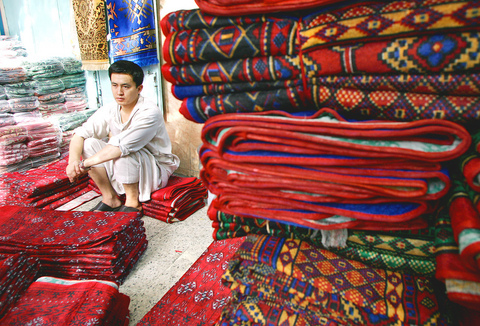Afghan carpet merchants on Jeddah's Bukharia Street are doing a brisk business in prayer mats, an essential item for the estimated 2 million pilgrims flocking to the Saudi holy city of Mecca.
A white-bearded elderly man in traditional Afghan dress seated behind a counter fiddles with his blue turquoise ring as clerks stack up rows of carpets of every color and design at a busy store in the old quarter of Jeddah, Saudi Arabia's second-largest city.
"Turkish prayer mats are big sellers," said Sheikh Ahmed Mohyeddin, 65, as his assistant Hamidallah Khan, 28, displayed several green and brown mats with elaborate patterns and gold glitter.

PHOTO: AFP
The best ones are woven at Istanbul's Kadifeteks factory, said Hamidallah, who has been working in Sheikh Ahmed's store for the past 15 years.
Mats and worry beads are the most popular items bought by pilgrims coming to Mecca to perform the annual pilgrimage, known as the hajj. Mats are used for the five-times-a-day Muslim prayers.
Although they are imported from Turkey, Iran, Egypt and increasingly China, most pilgrims perceive as blessed all purchases made during the hajj, which is one of the five pillars of Islam and a duty for devout and able Muslims.
Nearly 2.5 million pilgrims have arrived in Saudi Arabia for the start of hajj, according to a local press count.
Sheikh Ahmed said shopkeepers and middlemen from Mecca and Medina have been coming to his store for months to stock up on mats in preparation for the hajj season, the busiest time of the year.
The wholesale price of an average Turkish mat is 17 Saudi riyals (US$4.5) and it retails for about 25 riyals, he said.
Sheikh Ahmed, considered the doyen of the Bukharia street traders, is a member of Afghanistan's Uzbek minority.
He fled his native Mazar-i-Sharif in northern Afghanistan in 1978 in the aftermath of the pro-Soviet coup that brought the communists to power and landed in Jeddah where his uncle was a carpet merchant.
He said he immediately immersed himself in the business and took it over when his uncle died.
"There were only four little shops back then run by Afghans, now there are more than 100," he says.
It feels like little Kabul on Bukharia with bearded men in turbans and traditional baggy trousers and long shirts strolling down the street. Several bakers whip up Afghan flat bread.
Kheir Mohammed, 47, waits in his truck outside Shiekh Ahmed's store as workers load up boxes of prayer mats that he plans to sell in Mecca.
"The trend is toward Chinese mats," he said noting their price advantage at 3 riyals a piece over the Turkish ones.
In another part of old Jeddah, a Saudi store owner concedes the monopoly Afghan rug merchants have on the business.
"They have long experience and a knack for the trade," said Omar al-Attas, 60.

Conflict with Taiwan could leave China with “massive economic disruption, catastrophic military losses, significant social unrest, and devastating sanctions,” a US think tank said in a report released on Monday. The German Marshall Fund released a report titled If China Attacks Taiwan: The Consequences for China of “Minor Conflict” and “Major War” Scenarios. The report details the “massive” economic, military, social and international costs to China in the event of a minor conflict or major war with Taiwan, estimating that the Chinese People’s Liberation Army (PLA) could sustain losses of more than half of its active-duty ground forces, including 100,000 troops. Understanding Chinese

The Ministry of Foreign Affairs (MOFA) yesterday said it is closely monitoring developments in Venezuela, and would continue to cooperate with democratic allies and work together for regional and global security, stability, and prosperity. The remarks came after the US on Saturday launched a series of airstrikes in Venezuela and kidnapped Venezuelan President Nicolas Maduro, who was later flown to New York along with his wife. The pair face US charges related to drug trafficking and alleged cooperation with gangs designated as terrorist organizations. Maduro has denied the allegations. The ministry said that it is closely monitoring the political and economic situation

‘SLICING METHOD’: In the event of a blockade, the China Coast Guard would intercept Taiwanese ships while its navy would seek to deter foreign intervention China’s military drills around Taiwan this week signaled potential strategies to cut the nation off from energy supplies and foreign military assistance, a US think tank report said. The Chinese People’s Liberation Army (PLA) conducted what it called “Justice Mission 2025” exercises from Monday to Tuesday in five maritime zones and airspace around Taiwan, calling them a warning to “Taiwanese independence” forces. In a report released on Wednesday, the Institute for the Study of War said the exercises effectively simulated blocking shipping routes to major port cities, including Kaohsiung, Keelung and Hualien. Taiwan would be highly vulnerable under such a blockade, because it

UNRELENTING: China attempted cyberattacks on Taiwan’s critical infrastructure 2.63 million times per day last year, up from 1.23 million in 2023, the NSB said China’s cyberarmy has long engaged in cyberattacks against Taiwan’s critical infrastructure, employing diverse and evolving tactics, the National Security Bureau (NSB) said yesterday, adding that cyberattacks on critical energy infrastructure last year increased 10-fold compared with the previous year. The NSB yesterday released a report titled Analysis on China’s Cyber Threats to Taiwan’s Critical Infrastructure in 2025, outlining the number of cyberattacks, major tactics and hacker groups. Taiwan’s national intelligence community identified a large number of cybersecurity incidents last year, the bureau said in a statement. China’s cyberarmy last year launched an average of 2.63 million intrusion attempts per day targeting Taiwan’s critical